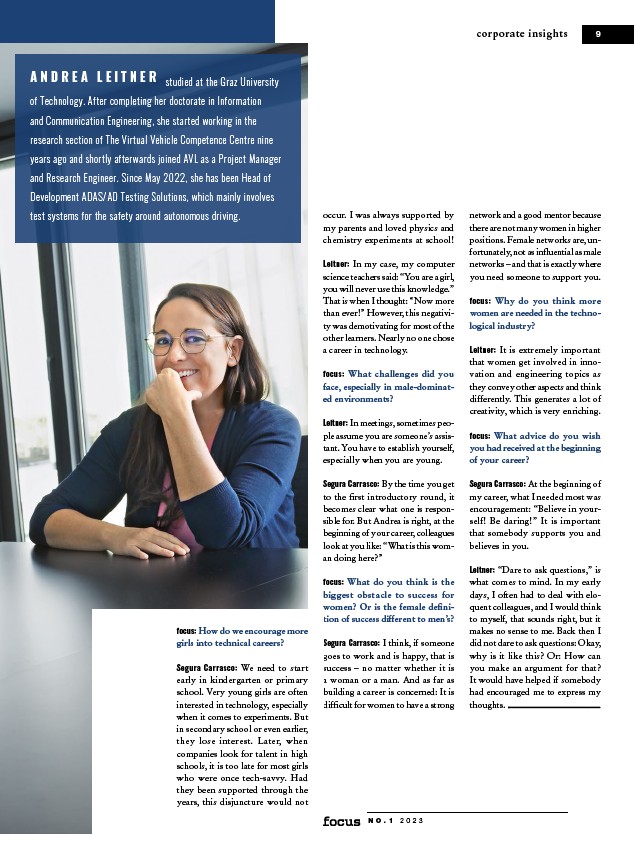
corporate insights 9
occur. I was always supported by
my parents and loved physics and
chemistry experiments at school!
Leitner: In my case, my computer
science teachers said: “You are a girl,
you will never use this knowledge.”
That is when I thought: “Now more
than ever!” However, this negativity
was demotivating for most of the
other learners. Nearly no one chose
a career in technology.
focus: What challenges did you
face, especially in male-dominated
environments?
Leitner: In meetings, sometimes people
assume you are someone’s assistant.
You have to establish yourself,
especially when you are young.
Segura Carrasco: By the time you get
to the first introductory round, it
becomes clear what one is responsible
for. But Andrea is right, at the
beginning of your career, colleagues
look at you like: “What is this woman
doing here?”
focus: What do you think is the
biggest obstacle to success for
women? Or is the female definition
of success different to men’s?
Segura Carrasco: I think, if someone
goes to work and is happy, that is
success – no matter whether it is
a woman or a man. And as far as
building a career is concerned: It is
difficult for women to have a strong
N O . 1 2 0 2 3
network and a good mentor because
there are not many women in higher
positions. Female networks are, unfortunately,
not as influential as male
networks – and that is exactly where
you need someone to support you.
focus: Why do you think more
women are needed in the technological
industry?
Leitner: It is extremely important
that women get involved in innovation
and engineering topics as
they convey other aspects and think
differently.
This generates a lot of
creativity, which is very enriching.
focus: What advice do you wish
you had received at the beginning
of your career?
Segura Carrasco: At the beginning of
my career, what I needed most was
encouragement:
“Believe in yourself!
Be daring!” It is important
that somebody supports you and
believes in you.
Leitner: “Dare to ask questions,” is
what comes to mind. In my early
days, I often had to deal with eloquent
colleagues, and I would think
to myself, that sounds right, but it
makes no sense to me. Back then I
did not dare to ask questions: Okay,
why is it like this? Or: How can
you make an argument for that?
It would have helped if somebody
had encouraged me to express my
thoughts. �
A N D R E A L E I T N E R studied at the Graz University
of Technology. After completing her doctorate in Information
and Communication Engineering, she started working in the
research section of The Virtual Vehicle Competence Centre nine
years ago and shortly afterwards joined AVL as a Project Manager
and Research Engineer. Since May 2022, she has been Head of
Development ADAS/AD Testing Solutions, which mainly involves
test systems for the safety around autonomous driving.
focus: How do we encourage more
girls into technical careers?
Segura Carrasco: We need to start
early in kindergarten or primary
school. Very young girls are often
interested in technology, especially
when it comes to experiments. But
in secondary school or even earlier,
they lose interest. Later, when
companies look for talent in high
schools, it is too late for most girls
who were once tech-savvy. Had
they been supported through the
years, this disjuncture would not